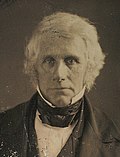Campaign
Democrats led by George Bancroft and Benjamin Hallett opened their campaign in April, as soon as Davis was announced as the Whig nominee. The Democrats accused Davis of hypocrisy in his claimed support for the "poor mechanic," given Davis's strong personal support for the Whigs' protective tariff policy, which Democrats claimed would cause "high prices for everything except labor." The Democratic campaign may have been hampered by the fact that Bancroft was Davis's brother-in-law.
Whigs ran a campaign focused on opposition to President Martin Van Buren, who was up for re-election, particularly over the issue of the Maine boundary dispute. One Whig, future U.S. Attorney General Caleb Cushing, even predicted that war with Great Britain was on the horizon. Whigs also campaigned against the proposal for an Independent Treasury system and in favor of their presidential candidate, the military hero William Henry Harrison. The Whig Boston Atlas attacked Bancroft and Hallet and accused the entire Democratic leadership of Locofocoism, while the more moderate Advertiser focused on promoting the Whig's national economic plan.
Whigs also attempted to attach the Morton campaign to the radical writings of Orestes A. Brownson, who had proposed an end to hereditary property inheritance, among other reforms. Democrats successfully distanced themselves from these proposals, but Morton did personally campaign in favor of a reduced ten-hour working day.
A September 10 rally by Whigs at Bunker Hill drew an estimated 50,000 supporters from as far as Mississippi. Senator Webster and Governors William Pennington of New Jersey and William W. Ellsworth of Connecticut, among others, spoke at the rally. Another Whig rally was held at Faneuil Hall on November 7, headed by Abbott Lawrence.
Late in the campaign on September 19, Bancroft launched an accusation that the Whigs were working with British capitalists, specifically the banking house Barings Brothers, to finance Harrison's campaign in exchange for the federal assumption of state debts. As support, Bancroft's Bay State Democrat cited the opinion of several London papers that Harrison's election would mean a return to a "sound and rational system." The Whigs dismissed the accusation out of hand.
The newly formed Liberty Party participated in the election, but was rejected by William Lloyd Garrison and other abolitionists as insufficiently resistant to slavery. Garrison's Liberator urged opposition to all three tickets.



